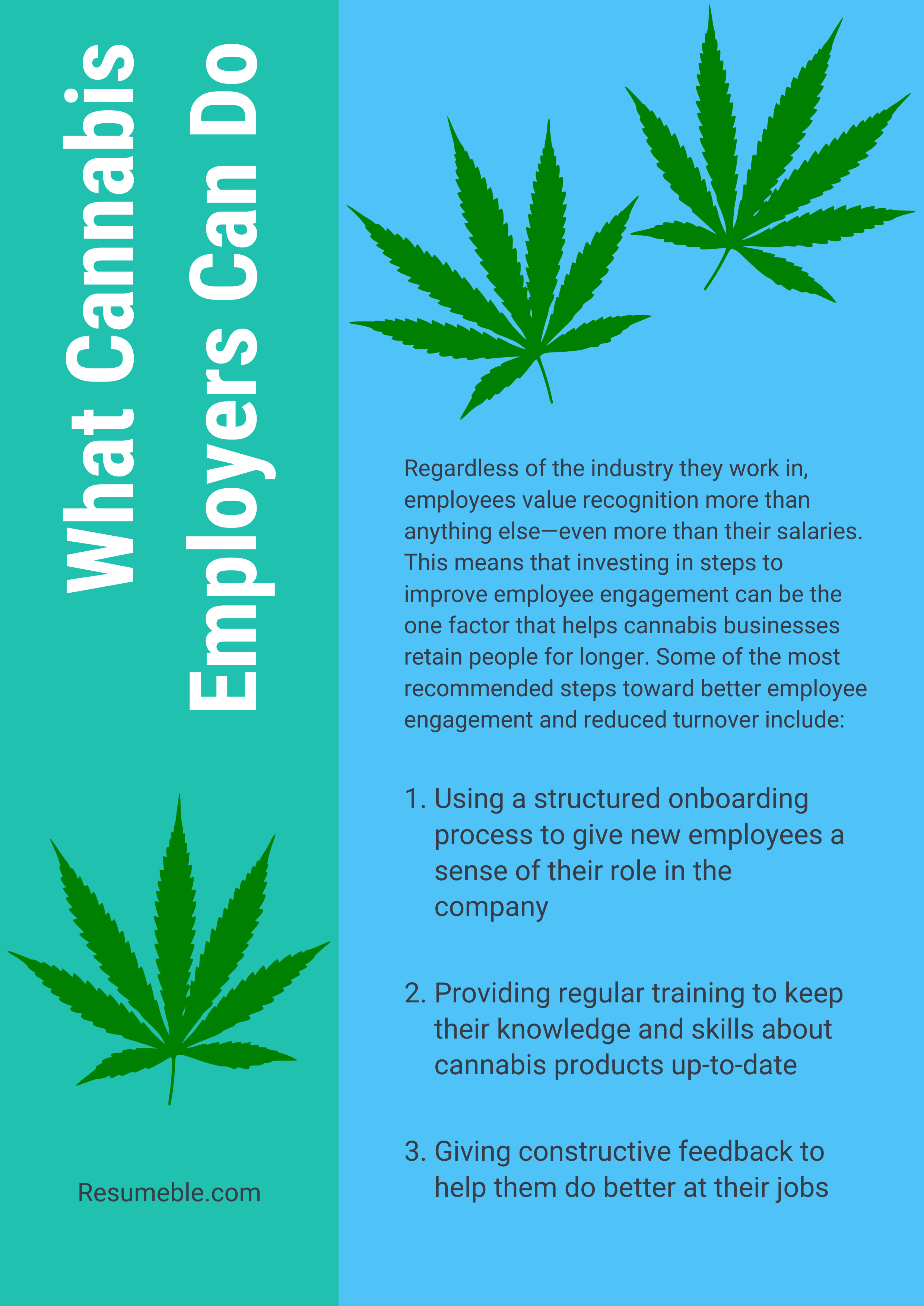At Resumeble, we pay close attention to growing trends in the global job market, and what’s happening right now in the cannabis industry hasn’t escaped our attention. Cannabis is enjoying unprecedented acceptance, not only in the United States but also in other parts of the world, including Canada, Europe, Australia, South America, and even parts of Asia.
Cannabis Industry: Challenges and Opportunities
With the unprecedented growth, however, came the arrival of new challenges that the budding (pun intended!) cannabis industry was widely unprepared for. Below is the list of three of the biggest obstacles that currently plague the industry as we know it. In addition, we also offer some insights into how these can be addressed.
High Turnover Rate
In the US, the speedy and massive growth of legal cannabis is dwarfing many other industries, especially in the area of job creation. According to Vangst’s 2024 Jobs report, the legal market now supports 440,445 full-time-equivalent positions. That’s a big jump ahead from 2020, when 243,700 full-time jobs were supported according to Leafly’s 2020 cannabis jobs count.
However, this good news is offset by excessively high turnover rates, with an average of 40% to 60% of employees leaving within the first two months alone. Contrast this with the three months it usually takes for a new employee to fully settle into the job, and one begins to see a picture of the serious employment problems that many cannabis businesses face.
High turnover results in substantial unnecessary costs for any business. The Center for American Progress estimates that replacing an employee can cost around 21% to as much as 213% of an employee’s annual salary, depending on the income bracket that the employee in question belongs to. When these costs aren’t accounted for, they will eventually lead to uncontrollable profit loss.
What Cannabis Employers Can Do

Regardless of the industry they work in, employees value recognition more than anything else, even more than their salaries. This means that investing in steps to improve employee engagement can be the one factor that helps cannabis businesses retain people for longer. Some of the most recommended steps toward better employee engagement and reduced turnover include:
- Using a structured onboarding process to give new employees a sense of their role in the company
- Providing regular training to keep their knowledge and skills about cannabis products up-to-date
- Giving constructive feedback to help them do better at their jobs
Ultimately, a cannabis employer’s goal is to keep workers happy. Happy employees lead to happy customers, and that can only be good for business.
The Stigma
Cannabis is still widely illegal in Australasia. That said, countries like Thailand, South Korea, and Australia have already approved their medical use. In fact, Australia has been at the forefront of medical cannabis research and commercialization. It’s also worth noting that some countries in the region, like Cambodia, don’t really enforce laws against its use in public. Just for comparison, no legal medical or recreational use is allowed in Laos. Authorities routinely detain and prosecute public users.
However, acceptance is one thing, integration another. Despite Australasians having a more widespread understanding of cannabis’s benefits, a stigma continues to surround it and its users, more so the people who want to work in a legal cannabis business.
“I think people are still potentially concerned that moving into the cannabis sector could be kind of ‘career suicide, that if they were to move to the cannabis sector and wanted to go back to a different, more traditional sector, that that might be hard for them to do because of the stigma.”
- said Alison McMahon, Chief Executive Officer at cannabisatwork.com, an HR agency that exclusively works on staffing cannabis businesses and providers.
Another ill effect of the cannabis stigma is that many banks and lending institutions are hesitant to finance cannabis-based businesses. Even in countries like the US, where cannabis has been legalized both for medicinal and recreational use, its continued classification as an illegal substance practically ensures that the banking aspect of cannabis will constantly be the elephant in the room that prevents the industry from being able to access traditional financing methods. Case in point: survey reveals that less than 4% of lending institutions across the US are willing to bankroll a cannabis business.
What Cannabis Businesses Can Do
Eliminating the stigma behind cannabis starts with a discussion to help people understand the health-improving effects of this natural plant. That discussion should start with people who have personally benefited from the use of cannabis. For cannabis owners, it can help to bring these ‘beneficiaries’ in to have a discussion with new employees to open their minds, or at least see the importance of their job. The goal is to turn your employees into advocates themselves. By having employees as your own brand advocates, you directly address any stigma they may feel about your product.
As for the banking aspect, the best thing to do would be to seek out lenders willing to invest in the cannabis industry. Sites such as Cannabis Credit Lines, Ganjapreneur, and Lender420 are great places to start this search.
And what can job applicants do to overcome this stigma? First of all, you should own your narrative. If you look at successful cannabis resume examples, you’ll notice a clear articulation of why the applicants are passionate about cannabis. Whether it’s plant science, patient wellness, social equity, or entrepreneurial opportunity, it’s all worth mentioning in the cannabis industry resume.
If you or a family member has benefited from medical cannabis, you can mention it briefly as part of your motivation for entering the field. This humanizes the plant and reframes you as an advocate for health.
Market Volatility

Owing to the fact that it is relatively in its infancy, the cannabis industry is far from being fully realized and remains largely turbulent. Oversaturation of markets, constant issues in tax structure, and black market competition - these are just some of the issues that contribute to instability in the legal cannabis industry, and small growers and retailers are the ones severely impacted by them.
Add to that the lack of sophistication in business operations, with many growers still thinking all that’s required for their business to thrive is to have a few plants under LED lights. Oftentimes, this means that a grower’s product runs afoul of regulations, which can lead to insurmountable obstacles for producers. Likewise, most of the new investors have no experience running a cannabis company, so the impact of their decisions is rarely understood by stakeholders as well as they could be.
What Cannabis Companies Can Do
All of these concerns can be attributed to the cannabis industry’s immaturity. As a cannabis business owner, user, or someone who’s involved in the industry in another way, there’s very little you can do on your own, but you can always find strength in numbers as they say, so you need to throw your support toward campaigns and initiatives that seek to help shape the cannabis industry as we know it today. Keep yourself updated on the latest trends. Attend cannabis conventions and events. Help fund medical cannabis initiatives that improve education and protect the rights of patients to accessibility. Promote efforts that help assure consumers that they are purchasing safe and effective products.
A final way to help the cannabis market mature is to increase the areas where positive cannabis usage is practiced. If alcohol is any indication, legalization is an effective way towards wider acceptance.
On the issue of improving systems and technologies, cannabis business owners need to accept that technology is their best tool for growth, and they should learn to apply it in most, if not every, aspect of business, from the cultivation and manufacture of cannabis to its retail and distribution. A few great resource examples for learning about cannabis business technologies include Cannabis Tech, Cannabis Business Daily, and Cannatech Today.
Growth Potential of the Legal Cannabis Industry
The global legal cannabis market was valued at USD21.0 billion in 2023 and is projected to skyrocket to USD102.2 billion by 2023. An annual growth rate of 14% is expected within the forecast period. This growth will be driven primarily by increasing legalization for medical as well as recreational use. That said, the medical segment continues to lead, with nearly 79% of global legal marijuana revenues in 2023. It is driven by approved therapies for chronic pain, chemotherapy-induced nausea, and neurological disorders.
North America remains dominant. The market reached USD36.7 billion in 2023 and is forecast to nearly double by 2030. Other markets (Europe, Latin America, Australasia) collectively account for the remaining share today, but are on steeper growth curves as legalization expands.
The continuing legalization of medical cannabis in many countries and territories is expected to sustain growth and create many opportunities for profit for market stakeholders.
What does this mean for job seekers in this industry? There’s a broad role spectrum. The demand for cultivation specialists, compliance managers, lab technicians, product developers, and retail professionals will surge. The upskilling opportunities are worth mentioning, too. With medical use still dominant, expertise in GMP/GLP, clinical-trial support, and regulatory affairs will be in high demand.
The emerging European and Latin American markets may present faster-rising salaries and leadership openings. As this job market trends imply, applicants open to geographic mobility will benefit from many opportunities.
Technical Skills for Cannabis Roles
If you’re targeting this industry, you’ll benefit from specific skills in your resume. They are certainly needed to beat the applicant tracking system, since employers set ATS to search for relevant qualifications. Of course, the needed hard skills will depend on the type of role you’re applying for. These are some of the skills useful in this industry:
Cultivation Techniques (hydroponics, organic soil, integrated pest management)
On your cannabis resume, list the specific systems you’ve used. For example: “Managed NFT hydroponic setup for 1,000 sq ft flowering room).” You can also mention any analytics tools you’ve used to track pH, EC, temperature, or humidity.
During interviews, you can describe a challenge you solved, such as a pest outbreak or a nutrient imbalance. The hiring manager will be interested in the exact steps you took. In the resume's accomplishments section, mention these challenges with quantified results!
Extraction Methods (CO2, ethanol, rosin pressing)
When writing your resume outline, plan to include yield metrics. For example: “Achieved 18% w/w THC recovery using supercritical CO2 extraction on 50 kg biomass.” Don’t forget to highlight the safety protocols you followed. If you dealt with pressure-vessel inspections or solvent-purge validation, mention it! The resume also has space for versatility. If you’ve cross-trained on multiple methods, you can list the exact ones.
Quality-Control Testing, Lab Safety, GMP/GLP Practices
Reference the exact standards you adhered to. You can quantify your impact like this: “Reduced batch-release failures by 30% through improved sterility checks.” You can also emphasize teamwork with QA/QC, such as: “Collaborated with a three-person QA team to update GLP documentation and train 10 staff.”
Packaging, Inventory Management Systems, POS Terminals
These are important skills for your resume, too. You should name the platforms you know: Metrc, BioTrackTHC, Leaf Logix, or any other. Indicate your level of proficiency there!
In the Skills section, describe a process improvement. For example: “Improved cycle counts, slashing reconciliation time from 4 hours to 1 hour per shift.” If you’re going for a customer-facing role, note your speed and accuracy. Like this: “Processed 100+ daily transactions with zero compliance discrepancies.”
Soft Skills
Soft skills are especially important for quality & compliance, dispensary, and corporate & ancillary roles. It’s important to read the job description carefully. If it emphasizes software, lab techniques, or cultivation methods, then you’ll highlight your hard skills. But if it calls out “strong communicator,” “team player,” or “customer-facing,” then lead with soft skills! Ultimately, you need to balance between both categories in your application.
These are the most important soft skills to highlight in a cannabis resume template:
Attention to Detail and Documentation
To demonstrate this skill, you can include an example of a time you caught a compliance error before it escalated. Offer to share a sanitized sample of a lab notebook entry, so the employer will get proof of your capacity.
You can also quantify error-reduction by stating, “Improved record-keeping accuracy by 25% through checklist implementation.”
Adaptability in a Newly Regulated, Fast-Changing Sector
Can you describe a time you learned a new regulation or software on the fly and applied it within days? That’s an important skill to have in a sector that’s evolving at a rapid pace. You can also stress out with cross-training experiences. For example, mention shifting from cultivation to compliance mid-harvest.
Proactive learning is an important soft skill to show. But you need to prove it with an example, like this: “Subscribed to weekly regulatory bulletins and helped monthly team briefings.”
Customer Service & Patient Empathy
If you’re applying for a role in dispensaries, empathy is crucial. You can share your experience of diffusing a frustrated customer by actively listening and using product knowledge. Although this is not the type of example you would mention in a resume objective, it’s great to share during an interview.
Note any patient-education materials you helped create. These may be brochures or dosing guides. If you have access to satisfaction metrics, list them in your resume like this: “Maintained 4.9/5 average patient-feedback rating over 6 months.”
Teamwork in Cross-Functional Grow, Processing, and Retail Teams
In your resume, it’s important to illustrate collaboration. For example: “Coordinated daily hand-offs between cultivation and extraction teams to ensure 0% downtime.” That’s a good example of management skills for a resume in the cannabis industry.
You should point out any leadership roles you’ve held in the past. For example: “Led a 5-person shift team in peak harvest season.” Most importantly, you should emphasize your communication skills through the following examples: “Instituted brief stand-up meetings that improve interdepartmental transparency.”
Sample Cannabis Resumes to Get You Inspired
We’ll give you three tailored resume examples. Each of them speaks directly to hiring managers in different segments of the cannabis industry. Remember: it’s OK to rely on AI resume writing and resume templates, but such an application will need some heavy editing. It’s always better to write the content yourself or hire a pro writer who knows how to make you stand out.
Cultivation Specialist Resume
This resume is designed for candidates pursuing grow-room or cultivation-floor roles. It emphasizes hands-on horticultural expertise, familiarity with hydroponic and soil-based systems, and a proven track record of optimizing yield and maintaining compliance. Note how the summary section immediately highlights specific cultivation techniques and metrics, so it sets a results-driven tone from the start.

Sales/Retail Resume
This example is perfect for a budtender or retail-floor position. The resume highlights customer service excellence, product knowledge, and point-of-sale proficiency. The opening summary positions the applicant as a patient-focused advocate. The experience bullets quantify sales achievements and satisfaction ratings, which are key signals for dispensary hiring managers.

Corporate (Legal/Compliance) Resume
This resume is tailored to in-house counsel, compliance managers, or regulatory affairs specialists. It highlights legal credentials, policy development experience, and deep knowledge of cannabis regulations. Since it’s so focused on regulations, you may need professional executive resume writers to help you with an application of this level.

Where to Find Cannabis Jobs
Like any other industry, cannabis offers plenty of career opportunities for professional growth and profit. That said, depending on the country you choose to work in, you may need to obtain a permit from the local government before you are allowed to handle cannabis products. When you work with the best resume writing services, professional writers can help you investigate the regulations and create an application that fits.
Here are some of the most popular job boards for those who want to pursue a lucrative career in this fast-rising market.
Hempstaff.com
Hempstaff is a cannabis recruitment and educational company. This means that aside from serving the staffing needs of cannabis businesses, Hempstaff also provides helpful and accurate information about the legal medical cannabis industry as a way to combat the stigma surrounding cannabis and its use.
Lumino
Lumino, previously known as Blume Jobs, has a very enticing slogan: “We won’t just hire candidates for the sake of it - we want to see businesses succeed.” Describing itself as a “Nimble & Fast Acting Recruitment Consultancy,” Lumino equips its partner cannabis companies with the skilled and talented workforce they need to meet capital objectives and ensure medical cannabis products reach their intended customers.
Vangst
Vangst is a recruitment and staffing marketplace that’s built exclusively for the cannabis industry. You can find thousands of live listings across cultivation, retail, corporate, and ancillary services. The platform is also known for its free career resources. You’ll find salary guides, role deep dives, and interview prep tailored to cannabis. If you’re wondering how long a resume should be for this industry, check out its resources to find guidance.
Leafly Careers
Leafly, the leading cannabis marketplace and information site, also hosts a dedicated jobs portal. It leverages Leafly’s brand recognition. Employers often post here to reach serious cannabis professionals.
Indeed
Indeed’s cannabis section is quite robust. It aggregates listings from niche boards, company sites, and recruiters. You’ll benefit from the standard Indeed tools: salary estimates, company reviews, and the Easy Apply feature. You can set up keyword- and location-based alerts specifically for cannabis, budtender, grower, and other relevant keywords.


